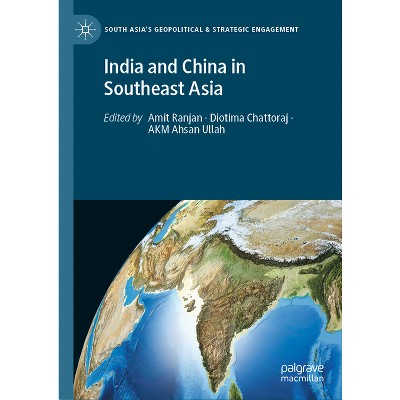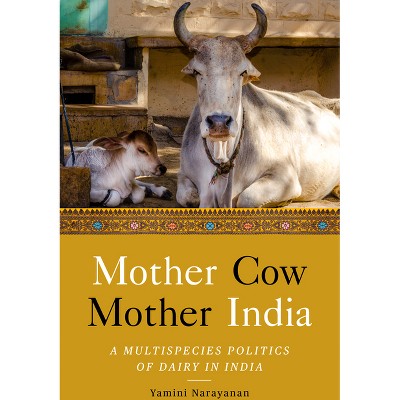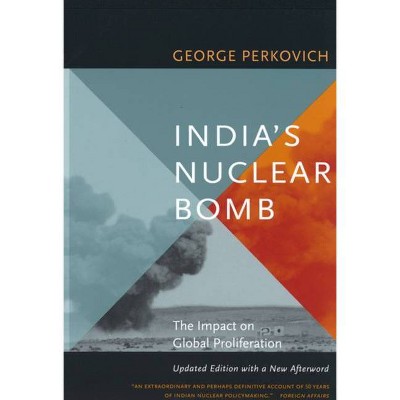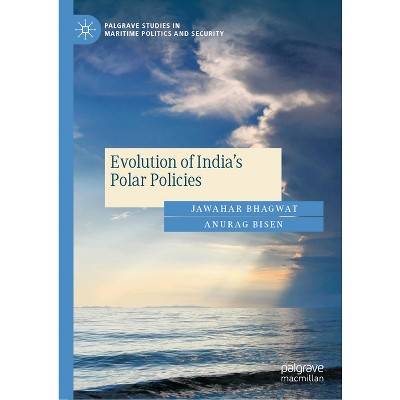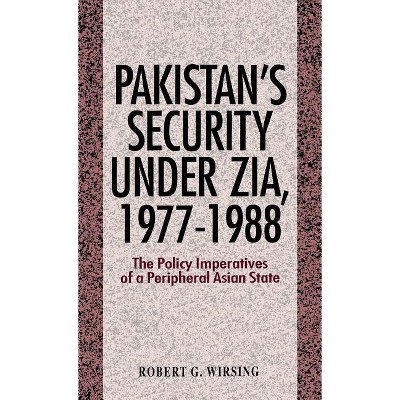India, Pakistan, and the Bomb - (Contemporary Asia in the World) by S Paul Kapur (Hardcover)

About this item
Highlights
- In May 1998, India and Pakistan put to rest years of speculation as to whether they possessed nuclear technology and openly tested their weapons.
- About the Author: Sumit Ganguly is professor of political science and holds the Rabindranath Tagoe Chair in Indian Cultures and Civilizations at Indiana University, Bloomington.
- 152 Pages
- Political Science, Security (National & International)
- Series Name: Contemporary Asia in the World
Description
About the Book
In May 1998, India and Pakistan put to rest years of speculation as to whether they possessed nuclear technology and openly tested their weapons. Some believed nuclearization would stabilize South Asia; others prophesized disaster. Sumit Ganguly and S. Paul Kapur, offer competing theories on the transformation of the region and what these patterns mean for the world's next proliferators.
Ganguly begins with an outcome-based approach emphasizing the results of militarized conflict. In his opinion, nuclear weapons have prevented Indo-Pakistani disputes from blossoming into full-scale war. Kapur counters with a process-based approach stressing the specific pathways that lead to conflict and escalation. From his perspective, nuclear weapons have fueled a violent cycle of Pakistani provocation and Indian response, giving rise to a number of crises that might easily have spun into chaos. Kapur therefore believes nuclear weapons have been a destabilizing force in South Asia and could similarly affect other parts of the world. With two major interpretations sure to spark discussion and debate, Ganguly and Kapur confront every fact of an urgent issue that has profound regional and global consequences.
Book Synopsis
In May 1998, India and Pakistan put to rest years of speculation as to whether they possessed nuclear technology and openly tested their weapons. Some believed nuclearization would stabilize South Asia; others prophesized disaster. Authors of two of the most comprehensive books on South Asia's new nuclear era, Sumit Ganguly and S. Paul Kapur, offer competing theories on the transformation of the region and what these patterns mean for the world's next proliferators. Ganguly begins with an outcome-based approach emphasizing the results of militarized conflict. In his opinion, nuclear weapons have prevented Indo-Pakistani disputes from blossoming into full-scale war. Kapur counters with a process-based approach stressing the specific pathways that lead to conflict and escalation. From his perspective, nuclear weapons have fueled a violent cycle of Pakistani provocation and Indian response, giving rise to a number of crises that might easily have spun into chaos. Kapur thus believes nuclear weapons have been a destabilizing force in South Asia and could similarly affect other parts of the world. With these two major interpretations, Ganguly and Kapur tackle all sides of an urgent issue that has profound regional and global consequences. Sure to spark discussion and debate, India, Pakistan, and the Bomb thoroughly maps the potential impact of nuclear proliferation.Review Quotes
A lucid and compact... distillation of an important policy debate.--Booklist
Ganguly and Kapur provide a thoughtful analysis that enhances our understanding of nuclear dynamics in a vitally important region.Political Science Quarterly--Political Science Quarterly
Their able and articulate treatments of these issues do the reader a service by crisply laying out the competing perspectives.--National Security Policy Proceedings
[The] combination of analytical rigour and empirical evidence makes this book a wonderful read as well as taking the optimist-pessimist debate to a new level of sophistication.--Harsh Pant "International Affairs "
Did the spread of nuclear weapons to India and Pakistan deter war or provoke aggression? Two prominent scholars of South Asian politics address this important question in a debate filled with insight and wit. Some readers will agree with Sumit Ganguly's optimistic assessment, and some will agree with S. Paul Kapur's more pessimistic appraisal. All will come away with a more nuanced understanding of the complex political effects of nuclear weapons.--Scott D. Sagan, The Caroline S.G. Munro Professor of Political Science, Stanford University
Sumit Ganguly and S. Paul Kapur give us an unusually productive dialogue between deeply informed scholars who disagree about an issue of great theoretical interest and policy relevance. The stability of the South Asian nuclear balance is debated with such a fruitful combination of analytical rigor and empirical evidence that students of both the region and the general topic of proliferation will learn a great deal.--Robert Jervis, Columbia University
These eminent scholars of nuclear proliferation achieve a masterful blend of policy-relevant theory, empirical research, and rigorous analysis. In doing so, they drive the optimism/pessimism debate to a refreshing new level of subtlety and sophistication. Policymakers and professors alike will be delighted to have this compelling book at hand.--Devin T. Hagerty, University of Maryland
This is a great book for learning about the India-Pakistan conflict as well as nuclear deterrence theory. Sumit Ganguly and S. Paul Kapur, both first-class strategists, examine the effects of nuclear weapons on the rivalry between Islamabad and New Delhi and reach carefully reasoned yet opposing conclusions.--John J. Mearsheimer, University of Chicago
About the Author
Sumit Ganguly is professor of political science and holds the Rabindranath Tagoe Chair in Indian Cultures and Civilizations at Indiana University, Bloomington. He is also a senior fellow at the Foreign Policy Research Institute in Philadelphia. His other publications include The Crisis in Kashmir: Portents of War, Hopes of Peace. S. Paul Kapur is professor in the Department of National Security Affairs at the U.S. Naval Postgraduate School and a faculty affiliate at Stanford University's Center for International Security and Cooperation. He is the author of Dangerous Deterrent: Nuclear Weapons Proliferation and Conflict in South Asia.





